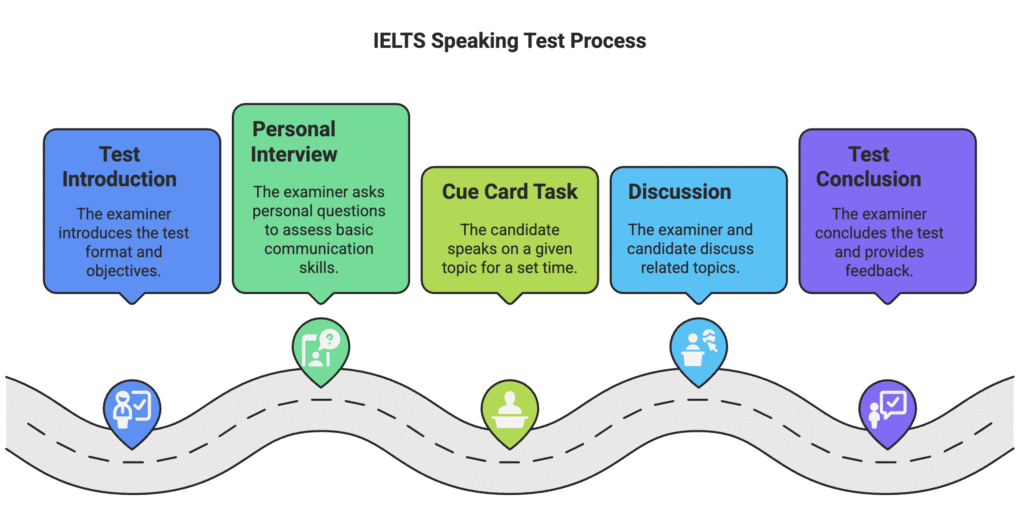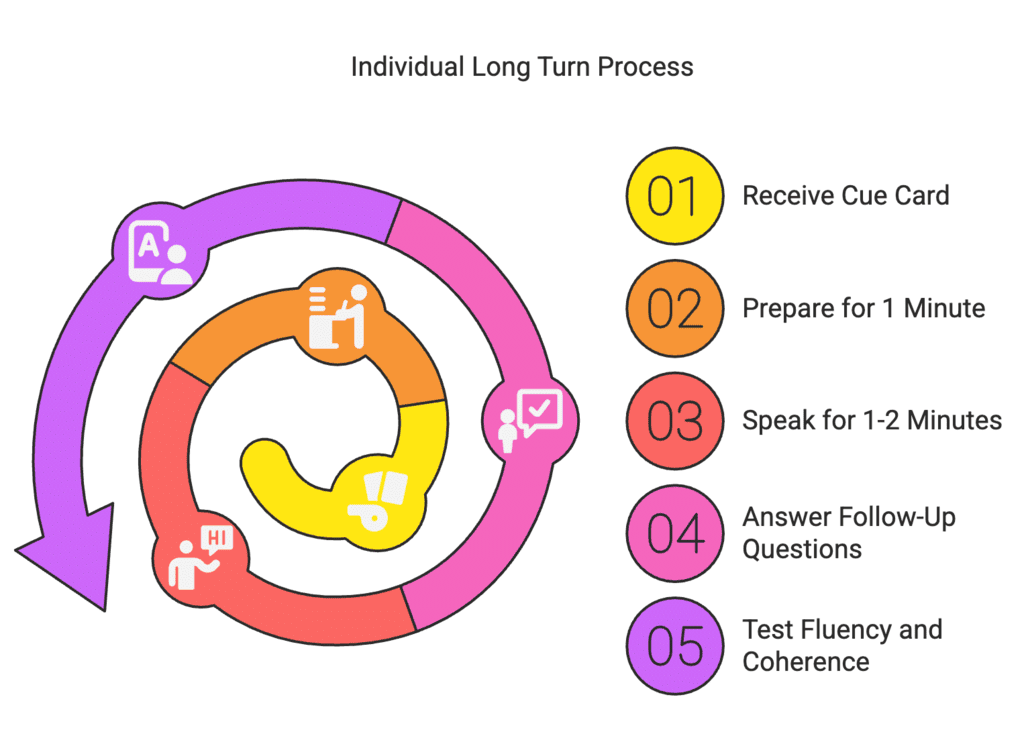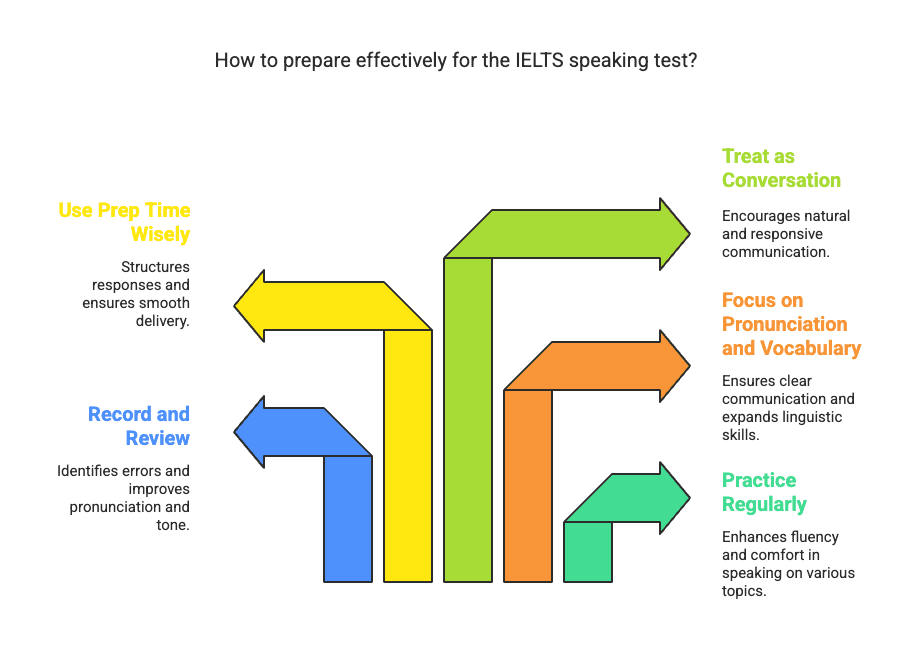All about the IELTS Speaking Exam | Speaking for IELTS PDF Download
| Table of contents |

|
| Introduction to the IELTS Speaking Exam |

|
| Structure of the Test |

|
| Biggest Challenges |

|
| Tips for Success |

|
Introduction to the IELTS Speaking Exam
- Welcome to your comprehensive guide to the IELTS Speaking Test.
- Whether you're taking the Academic or General Training version of the IELTS, the Speaking section remains the same for all candidates. It is evaluated using a standard set of criteria, ensuring a fair and consistent assessment for everyone.
What is the IELTS Speaking Exam?
- The IELTS Speaking Test is designed to assess your spoken English skills through a structured, face-to-face interview with a certified examiner.
- This interaction may take place in person or via a secure video call, and the entire session is audio-recorded.
- This recording ensures transparency and allows candidates to request a re-evaluation if they wish.
Key Details
Duration: The test lasts approximately 11 to 14 minutes.
Format: It is conducted in the form of a natural conversation. While it follows a structured format, the tone remains relaxed and informal, encouraging you to use everyday spoken English.
Examiner-led: The examiner guides the conversation, manages the time, and transitions between different parts of the test. You are not expected to manage the flow of the conversation—your job is to focus on communicating clearly and confidently.

Structure of the Test
The IELTS Speaking test is designed to assess your spoken English in a realistic, conversational format. It is divided into three parts, each focusing on different types of questions and communication skills.
Part 1: Introduction and Interview (4-5 minutes)
This part serves as a warm-up and is the most relaxed section of the test. The examiner will introduce themselves and confirm your identity. After that, you’ll be asked about familiar topics related to your personal life.
You can expect around 12 questions across 3 common themes such as your home, hometown, family, studies, work, hobbies, or even light topics like colors, weather, or daily routine.
These are simple, opinion-based questions, so you don’t need to prepare any complex ideas.
The purpose is to assess how well you can communicate basic information and express personal opinions with ease.
Tip: Don’t give one-word answers. Aim to expand each response with explanations, examples, or brief details.
Part 2: Individual Long Turn (3-4 minutes)
This is your opportunity to speak without interruption for up to two minutes.
You’ll be handed a cue card with a topic and bullet points that guide your response (e.g., “Describe a book you recently read…”).
You'll be given 1 minute to prepare and can make notes on the paper provided.
After the preparation time, you’ll be expected to speak for 1 to 2 minutes continuously on the topic.
The examiner will then ask 1 or 2 short follow-up questions related to your talk.
This section tests your fluency, coherence, and ability to organize your thoughts clearly.
Tip: Aim to speak for the full 2 minutes. Use your preparation time wisely to plan your introduction, main ideas, and conclusion.

Part 3: Discussion (4-5 minutes)
This final section involves a more in-depth discussion based on the theme introduced in Part 2.
The examiner will ask you a series of opinion-based or abstract questions, encouraging you to express your thoughts in greater detail.
These questions may explore broader or more global issues, such as education systems, technology’s impact, or cultural differences.
You’ll be expected to analyse, compare, justify, and speculate using a wide range of vocabulary and more complex sentence structures.
This part is designed to evaluate your critical thinking, ability to engage in a conversation, and how well you develop and support your ideas in spoken English.
Tip: Try to stay calm and focused, and don’t be afraid to express personal opinions or hypothetical ideas—even if they differ from common views.
Biggest Challenges
Many candidates find the IELTS Speaking test challenging—not because it’s overly difficult, but because it requires you to think, organize, and speak in real time using accurate and fluent English. To succeed, you’ll need to overcome the following common challenges:
Having Enough to Say
You won’t know the exact topics in advance, so it's essential to prepare across a wide range of everyday and abstract topics. This helps ensure you're never caught off guard and always have something meaningful to say.Expanding Your Responses
Short, one-line answers won’t help you score well. You must be able to add detail, explain your reasoning, and give examples to fully demonstrate your language ability.Speaking Naturally and Fluently
It’s not just about using correct grammar—it’s about speaking in a way that sounds smooth, natural, and connected. This includes good pacing, minimal hesitation, and clear sentence flow.Expressing Opinions Clearly
In Parts 2 and 3, you’ll be expected to express and defend your opinions. Many students struggle to share their views confidently, especially on unfamiliar or abstract topics.Staying Calm and Focused
Nervousness can affect fluency, clarity, and coherence. You need to remain calm, stay engaged, and treat the test like a normal conversation, not a high-pressure interview.
Tips for Success
Here’s how you can prepare effectively and improve your performance:
Practice Regularly Across Different Topics
The more you speak, the more comfortable and fluent you’ll become. Practice talking about personal experiences, current events, opinions, and everyday topics. Use IELTS sample questions as practice prompts.Record and Review Yourself
Recording your responses helps you catch repeated errors, notice gaps in fluency, and work on your tone and pronunciation. It also builds awareness of your speaking style.Focus on Pronunciation and Vocabulary
Clear pronunciation—not a native accent—is what matters. Also, expand your vocabulary to include useful connectors, descriptive words, and topic-specific terms.Make the Most of Preparation Time (Part 2)
Use the 1-minute prep time in Part 2 wisely: jot down key points, structure your response (introduction, main points, conclusion), and aim to speak smoothly for the full 2 minutes.Treat It Like a Conversation
Remember, the test is designed to reflect real-life communication. Be natural, friendly, and responsive. Avoid memorized scripts—they sound robotic and limit your flexibility.

The IELTS Speaking test is as much about confidence and mindset as it is about language ability. With consistent practice and the right strategies, you'll not only speak better—you'll speak with clarity, confidence, and control.
You’ve got this—good luck!
|
34 videos|170 docs
|
FAQs on All about the IELTS Speaking Exam - Speaking for IELTS
| 1. What is the structure of the IELTS Speaking Exam? |  |
| 2. What are the biggest challenges faced by candidates in the IELTS Speaking Exam? |  |
| 3. How can I prepare effectively for the IELTS Speaking Exam? |  |
| 4. What tips can help me succeed in the IELTS Speaking Exam? |  |
| 5. How is the IELTS Speaking Exam scored? |  |




















